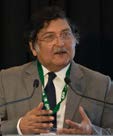

Sugata Mitra*
Professor Emeritus, NIIT University, Neemrana, Rajasthan, India
Children, given access to the Internet in groups, can come to know anything by themselves. However, “knowing” may no longer be as important as it used to be.
I knew nothing of this when, in 1999, I did an experiment to find out whether children who knew nothing of computers or the Internet, and had almost no English, would make any sense of a digital environment. A computer was embedded in a wall of a slum, like a crude do-it-yourself ATM. The press called it “The Hole in the Wall.”
The results are well known now. Within a couple of weeks, the children had learned to use the Internet and to download and play games. After a month, they had learned how to do searches and answer questions.
My research colleagues and I repeated the experiment many times in the slums and villages of India. The results were always the same: digital literacy out of nowhere.
It became clear that children in groups have an understanding that is greater than that of each individual. It was this collective “hive mind” that was working, like an efficient teacher. I had seen nothing like this before, and it took me years to realise that what we were witnessing was an example of a self-organising system, where spontaneous order appears out of nowhere.
I brought the results to England in 2006. There, the Hole in the Wall transformed itself into Self-Organised Learning Environments (SOLEs). Children would cluster around a few computers to answer a question. The framing of this question was important. It needed to be interesting. For example, instead of “What is photosynthesis?” the question was “Why are leaves green?” We called these “big questions.” There were only a few computers, as it was the clustering that let self-organisation happen.
Significant improvements happened in English reading comprehension, conversation skills, self-confidence and, of course, Internet usage and searching skills.
“So is the teaching profession as we know it headed for obsolescence?”
The teaching profession caters to an examination system that was created to serve the needs of another time. This examination system requires learners to answer questions on paper, using handwriting. The learner must be alone and not in communication with anyone. The learner must not use any assistive technology other than a pencil, and perhaps a ruler — 19th-century technology.
To cater to the needs of such examination systems, teachers, good or bad, need to use teaching methods from the 19th century, consisting of rote learning, drills, practice and negative reinforcement.
After the school years, when erstwhile learners enter the real world, they are expected to solve problems using the Internet, to collaborate with others while solving problems, to type rather than write by hand, to use calculators and not their minds to calculate, to use spell checkers and grammar checkers while typing, and so on. In other words, learners are asked to do the opposite of what they did in school.
Examinations need to be changed to include collaborative problem solving using assistive technology. If this is done, teachers will be free to enable learning in novel ways.
This has to happen. There is a generation that uses assistive technology, particularly smartphones, all the time, except when they are in school. They learn continuously from these devices.
There is powerful resistance to these ideas. The resistance comes from an older generation with a subconscious desire to return to the 1920s, a time they believe was the best the world ever had. The examination system is obsolete, and so are the teachers who are forced to cater to it.
Fortunately, teachers understand this. Since 2014, teachers in all five continents have been making SOLEs in their schools. I have lost count of how many there are. Collectively, they are changing the nature of education.
When automobiles took over from horse-drawn carriages, the coachmen went away, and the passengers became the drivers. Eventually, cars will drive themselves, and driving will become an obsolete skill. A child 20 years from now will ask, “What does ‘driving’ mean?” When the Internet takes over from “taught” schools, learners will become their own teachers. But only for a while, until the immense network drives all learning and makes “knowing” itself obsolete.
A child 20 years from now may well ask, “What does ‘knowing’ mean?”
*Formerly Professor of Educational Technology at Newcastle University in the UK. He was awarded the first-ever one-million-dollar TED Prize in 2013. More details are available at www.cevesm.com.


